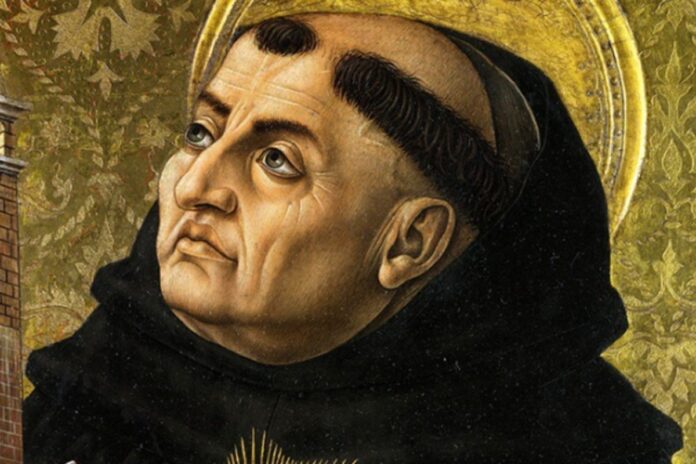Saint Thomas Aquinas (1225 – 7 March 1274) was an Italian Dominican friar and priest, renowned as the leading Scholastic thinker of his time. He is widely regarded as one of the most influential philosophers and theologians in the Western intellectual tradition. Born in the county of Aquino, which was part of the Kingdom of Sicily, Aquinas’s work has had a profound and lasting impact on both theology and philosophy. His synthesis of Christian theology with Aristotelian philosophy remains a cornerstone of Catholic doctrine.
Introduction
Saint Thomas Aquinas is widely regarded as one of the most influential philosophers and theologians in Western history. His profound insights into faith, reason, and the natural world have shaped Christian thought for centuries. Born in the 13th century, Aquinas made groundbreaking contributions to philosophy, particularly with his synthesis of Aristotelian philosophy and Christian doctrine. But who was Thomas Aquinas, and what made him so remarkable? In this article, we’ll explore the life, work, and enduring legacy of this brilliant thinker, offering a deeper understanding of why his ideas still resonate today.
The Early Life of Saint Thomas Aquinas
A Humble Beginning
Thomas Aquinas was born around 1225 in Roccasecca, Italy, to a noble family. Despite his noble birth, Aquinas chose a path that would set him apart from his peers—one that would focus on religious and intellectual pursuits. Early on, his parents hoped he would become a Benedictine abbot, but Thomas had different plans, joining the Dominican Order against their wishes. His decision would later prove to be pivotal in shaping the direction of his studies and contributions.
Education and Intellectual Formation
Aquinas’ academic journey began at the University of Naples, where he first encountered the works of Aristotle, which would have a profound influence on his later writings. He went on to study at prestigious institutions, including the University of Paris, where he was mentored by Albert the Great. These years of rigorous intellectual training laid the foundation for his later works that would merge faith with reason.
Key Works and Philosophical Contributions
Summa Theologica: A Masterpiece of Theology
Perhaps his most renowned work, the Summa Theologica is a comprehensive synthesis of Christian theology, ethics, and philosophy. In it, Aquinas addressed questions of faith, morality, and the existence of God, offering detailed arguments and discussions that became central to Catholic doctrine. The Summa remains an essential text in Christian theology today.
The Five Ways: Proofs of God’s Existence
One of Aquinas’ most famous contributions is his “Five Ways” to demonstrate the existence of God. Drawing on logic and the natural world, Aquinas argued that God’s existence could be inferred through empirical evidence, a groundbreaking approach that integrated reason and faith.
Ethics and Natural Law
Aquinas’ philosophy also laid the groundwork for the concept of natural law, which argues that moral principles are inherent in the natural world and accessible through human reason. This idea has influenced not only Catholic doctrine but also modern legal and ethical theory.
The Legacy of Saint Thomas Aquinas
Influence on Christian Thought
Aquinas’ work profoundly influenced Christian philosophy, especially within the Catholic Church. His ideas became a cornerstone of Catholic teaching, and he was declared a Doctor of the Church in 1567, cementing his importance in religious thought.
Aquinas in Modern Philosophy
Though Aquinas wrote in the 13th century, his ideas still hold significant weight in modern philosophy and theology. His integration of faith and reason influenced thinkers from the Renaissance to contemporary philosophers. His synthesis of Aristotelian philosophy with Christian doctrine provided a model for Christian thinkers to follow for centuries.
Aquinas’ Role in Education
Beyond his theological contributions, Aquinas’ method of reasoning and his emphasis on education and learning have had a lasting impact on the academic world. His focus on logic and rational discourse in understanding the world has been a touchstone for educational institutions, particularly in the liberal arts and sciences.
Frequently Asked Questions (FAQ)
1. What are the key ideas of Saint Thomas Aquinas?
Saint Thomas Aquinas is best known for his integration of faith and reason. His philosophical approach includes the belief in natural law, the five ways to prove God’s existence, and his teachings on ethics and morality.
2. Why is Saint Thomas Aquinas important in Christian theology?
Aquinas played a crucial role in shaping Catholic doctrine, particularly with his works like the Summa Theologica. His ability to blend Aristotle’s philosophy with Christian beliefs provided a lasting framework for understanding faith and reason.
3. What is the Summa Theologica?
The Summa Theologica is Aquinas’ most famous work, a comprehensive text that covers topics such as the existence of God, the nature of humanity, and ethical behavior. It’s considered a cornerstone of Catholic theology.
4. How did Aquinas’ philosophy influence modern thought?
Aquinas’ ideas on reason, ethics, and the natural world continue to influence modern philosophy, especially in fields like ethics, law, and theology. His approach to integrating rational thought with religious beliefs remains foundational in many academic fields.
Wrapping Up: The Enduring Influence of Saint Thomas Aquinas
Saint Thomas Aquinas was a philosopher who reshaped the way people think about faith, reason, and morality. His works continue to inspire deep philosophical inquiry and religious contemplation, bridging the gap between reason and belief. Whether you’re a scholar of theology or simply interested in learning more about the history of ideas, Aquinas’ teachings remain a valuable resource. His legacy reminds us that the pursuit of knowledge, whether through faith or reason, is a lifelong journey that shapes the world around us.




